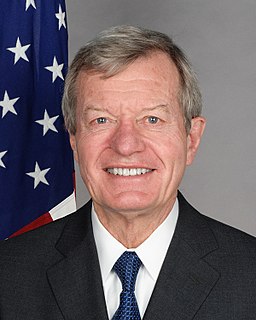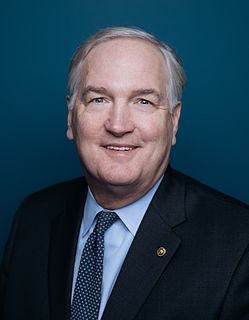A Quote by Max Baucus
The Founding Fathers provided a way to reverse unpopular Supreme Court decisions: a constitutional amendment.
Related Quotes
Any constitutional amendment that simply gives Congress the option of regulating campaign finance fails to immediately achieve what the American people want, and that is a complete reversal of Citizens United and other Supreme Court decisions that have allowed corporations and the wealthy few to drown out the voices of everyday voters.
In fact, Native American Rights Fund has a project called the Supreme Court Project. And quite frankly, it's focused on trying to keep cases out of the Supreme Court. This Supreme Court, Justice Roberts is actually, hard to believe, was probably worse than the Rehnquist Court. If you look at the few decisions that it's issued.
I prefer an income tax, but the truth is I am afraid of the discussion which will follow and the criticism which will ensue if there is an other division in the Supreme Court on the subject of the income tax. Nothing has injured the prestige of the Supreme Court more than that last decision, and I think that many of the most violent advocates of the income tax will be glad of the substitution in their hearts for the same reasons. I am going to push the Constitutional amendment, which will admit an income tax without questions, but I am afraid of it without such an amendment.
Of course, such judicial misconstruction theoretically can be cured by constitutional amendment. But the period of gestation of a constitutional amendment, or of any law reform, is reckoned in decades usually; in years, at least. And, after all, as the Court itself asserted in overruling the minimum-wage cases, it may not be the Constitution that was at fault.
Now I realize it's fashionable in some circles to believe that no one in government should encourage others to read the Bible. That we're told we'll violate the constitutional separation of church and state established by the Founding Fathers and the First Amendment. The First Amendment was not written to protect people and their laws from religious values. It was written to protect those values from government tyranny.
Class warfare always sounds good. Taking action against the rich and the powerful and making 'em pay for what they do, it always sounds good. But that's not the job of the Supreme Court. The Supreme Court standing on the side of the American people? The Supreme Court adjudicates the law. The Supreme Court determines the constitutionality of things and other things. The Supreme Court's gotten way out of focus, in my opinion.
This [anti-terrorism bill] is a violation of the First Amendment right to free speech and the Fourth Amendment protection of private property... Some of these provisions place more power in the hands of law enforcement than our Founding Fathers could have dreamt and severely compromises the civil liberties of law-abiding Americans. This bill, while crafted with good intentions, is rife with constitutional infringements I could not support.
Here is what Hillary Clinton said. Crooked Hillary said, "You know, when we talk about the Supreme Court" - fake smile - "it really raises the central issue in this election, namely what kind of country are we going to be." Well, she's right about that, actually, but not in the way she means. "What kind of opportunities will we provide our citizens." The Supreme Court's not about that. Supreme Court is the law, and their cases are not about opportunities being provided for our citizens.
I am very proud of our Supreme Court - it is one of the best worldwide. Nevertheless, since the 1990s, we have seen a certain imbalance in the relationship between the judiciary, the parliament and the government. The Supreme Court behaved in an activist way. We have to debate the degree to which such Supreme Court activism is appropriate.
































